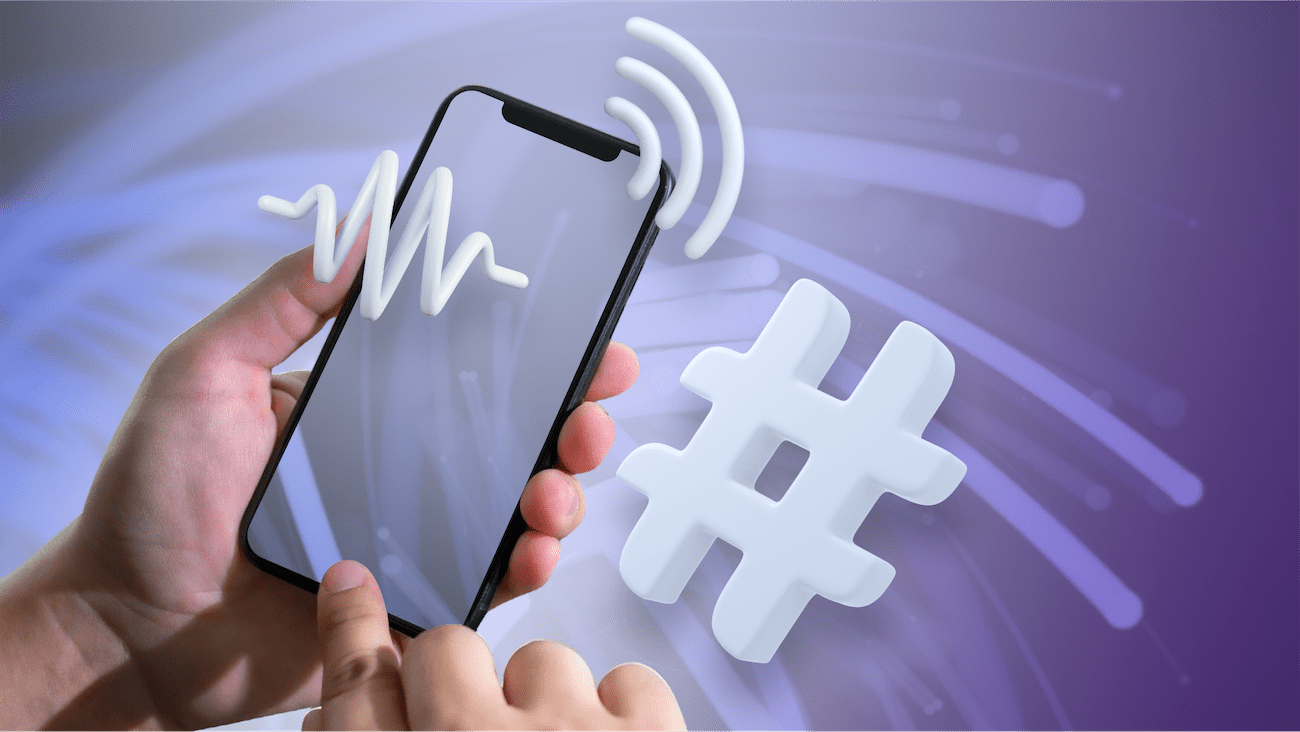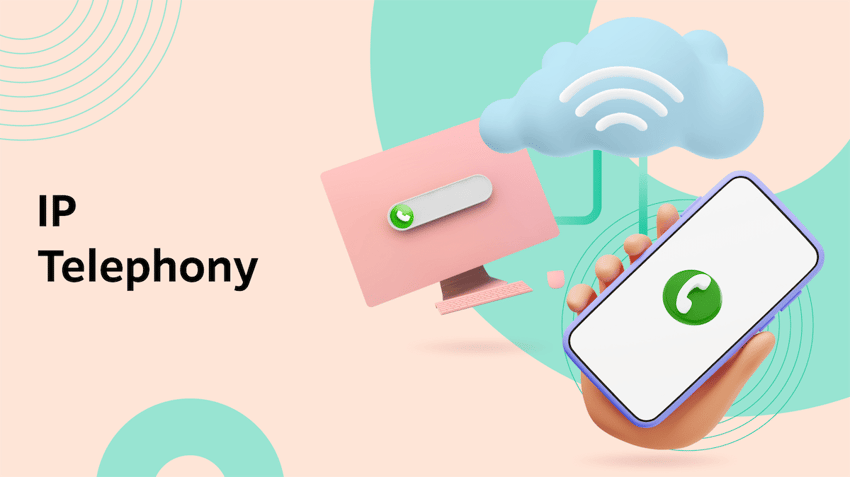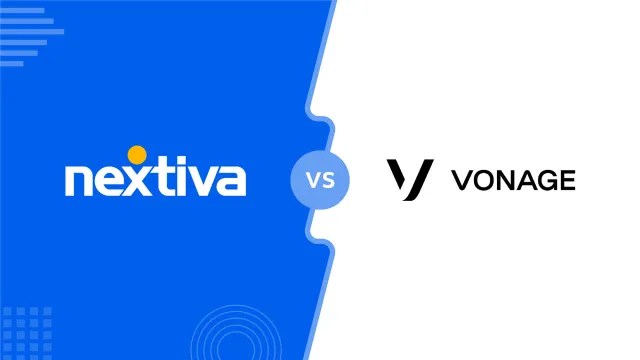Whether you’re a business owner, a remote worker, or someone who wants to stay connected, a VoIP number might just be the communication upgrade you’ve been waiting for.
It’s like a regular business phone number that works over the internet, giving you flexibility and savings that traditional landline phones just can’t match.
Let’s look at what a VoIP number is and how you can get one. We’ll also discuss how to get a cloud VoIP service started and several easy ways to protect your business phone numbers from fraud, too.
What Is a VoIP Number?
A VoIP number is a real telephone number operating on an internet connection. Voice over IP phone numbers are assigned to a user and not to a physical location. This means you can use your VoIP number anywhere via a VoIP phone app that works on any mobile device or desktop computer.
The best part about a VoIP phone number is that you aren’t bound to a specific desk to take phone calls — you can take or make calls anywhere using your VoIP number.
Cloud-based VoIP technology lets you call from anywhere using an app on your mobile phone, computer, laptop, or desk phone using the same number without needing a physical private branch exchange (PBX).

How Do VoIP Numbers Work?
VoIP works by placing calls over the internet rather than copper wires used by the public switched telephone network (PSTN). Unlike traditional phone service, where phone calls must be routed through the local telephone company, VoIP phone service uses any broadband connection. With this method, VoIP routes a call along the most efficient path.
VoIP also extends to other forms of communication, like chat and SMS messaging. A business owner can select VoIP phone numbers for its staff, even if they work remotely. With VoIP, a traditional phone line becomes obsolete for both business and residential use.
Switch to Nextiva today and save up to 60%
Join now and start calling in less than 10 minutes. Instant set up. Enterprise-grade reliability.
Types of VoIP Numbers
VoIP technology offers different phone number options with specific features and purposes in mind.
1. Local numbers
Local VoIP numbers are associated with specific geographic areas, usually a city or region. They use familiar area codes, creating a sense of local presence, even if the business isn’t physically located there. This builds trust and credibility, particularly in markets where customers prefer dealing with local companies and work well for small businesses.
2. Toll-free numbers
Recognizable by area codes like 800 or 888, toll-free numbers allow customers to call without incurring charges. They’re ideal for customer service, sales, and national businesses. Toll-free numbers also convey a sense of professionalism and accessibility.
3. Vanity numbers
Vanity numbers are customized spellings, often using words or phrases related to the business (e.g., 1-800-FLOWERS). These numbers are easy to remember and great for marketing, particularly in radio or TV ads. While potentially pricier, their memorability can significantly enhance brand recognition.
4. Direct inward dialing (DID) numbers
DID numbers enable direct connections to specific extensions within an organization, bypassing main reception. These numbers streamline communication in large companies, reducing receptionist workload and caller wait times. DID also benefits remote workers, making them appear part of the main office system.
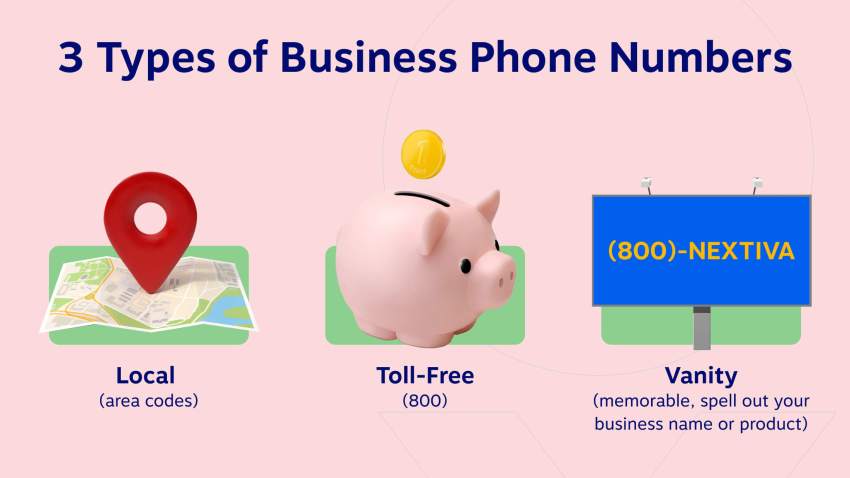
5. Virtual numbers
Unbound by location or device, virtual phone numbers can be forwarded to any phone or device. This flexibility is perfect for remote workers, freelancers, or businesses with a distributed workforce. Professionals can maintain a consistent number regardless of their physical location.
6. International numbers
These are local numbers in foreign countries, enabling businesses to establish a virtual presence abroad. Customers are charged at local rates, making it more likely they’ll call. International calling builds trust and accessibility for businesses with a global customer base.
7. Ported numbers
Ported numbers are existing numbers transferred from a traditional phone service or another VoIP provider. They work best for businesses with established brand recognition tied to their number. You can easily transition to VoIP without losing customer connections.
Choosing the right VoIP number type depends on your target audience, business size, geographic scope, and branding. Selecting the right combination helps businesses create a communication system that’s flexible, efficient, and customer-centric.
VoIP Phones vs. Landlines
The mode of transmission between the two technologies is not the same. A VoIP phone number does not get assigned to a location, while a regular phone number does.
Also, the underlying technologies are dramatically different. A standard landline number travels through copper phone lines. A VoIP number utilizes data networks, such as the internet and internal enterprise LANs (Local Area Networks), to make voice calls.
| Feature | VoIP Phones | Landlines |
|---|---|---|
| Mode of transmission | Internet (data networks) | Copper phone lines |
| Number assignment | Assigned to a user | Assigned to a physical location |
| Flexibility | High (can be used anywhere with internet) | Low (tied to a specific location) |
| Features | Wide range of features (unlimited calling, call forwarding, voicemail, conference calling, etc.) | Limited features |
| Cost | Generally lower cost | Higher cost |
| Reliability | Dependent on internet connection | Generally reliable, but can be affected by physical damage to lines |
Key Features and Functionalities of VoIP Numbers
Let’s look at the key features and functionalities that make VoIP numbers a powerful communication tool:
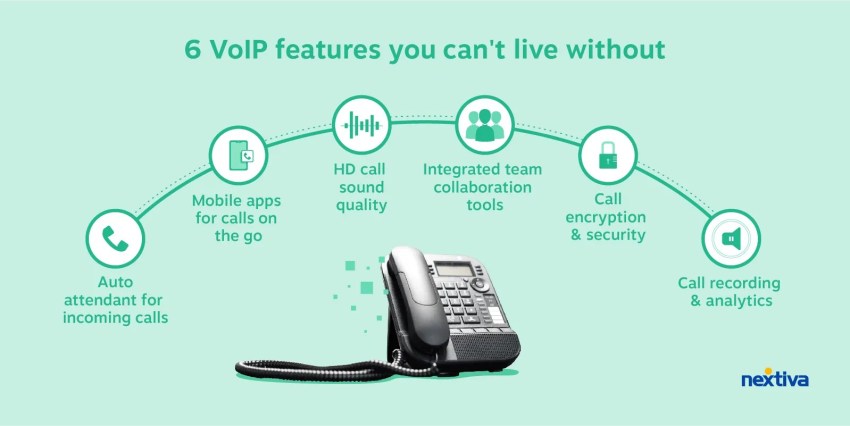
- Call forwarding: Redirect incoming calls to other business numbers, ensuring you never miss an important call, even when you’re away from your primary device. You can set up forwarding based on specific conditions, such as time of day or caller ID.
- Voicemail to email/text: VoIP systems often transcribe voicemails and send them to your email or as text messages, so you can conveniently review messages even when you can’t listen to them directly.
- Conference calling: Host virtual meetings or collaborate with multiple people simultaneously using conference calling features, eliminating the need for in-person gatherings and saving time and travel costs.
- Auto attendant or IVR: Create a professional first impression with an automated receptionist or interactive voice response (IVR) system that greets callers and directs them to the appropriate department or extension. Enhance efficiency and provide a seamless caller experience.
- Call recording: Record calls for training, quality assurance, or compliance purposes. Particularly valuable for businesses that need to monitor customer interactions or keep records of important conversations.
- Caller ID Customization: Display a specific name or number on the recipient’s caller ID, enhancing professionalism and brand recognition.
- Virtual faxing: Send and receive faxes digitally, eliminating the need for a physical fax machine.
- Integration with CRM and other tools: Many VoIP providers offer integrations with popular Customer Relationship Management (CRM) software and other business tools, optimizing workflows and enhancing productivity.
- Mobile apps: Access your VoIP number and its features from anywhere using dedicated mobile apps and stay connected even when you’re on the move.
- Video calling: Some VoIP providers offer video conferencing capabilities, enabling face-to-face communication over the internet.
These advanced features collectively make VoIP numbers a versatile and powerful communication solution. You get better flexibility, control, and advanced capabilities to stay connected in a digital-first world.
How Do I Get a VoIP Number?
Getting a VoIP number is straightforward and surprisingly affordable. Here’s a breakdown of the steps involved:
- Choose a VoIP service provider: Research and compare different providers based on their features, pricing plans, uptime guarantees, customer support quality, and overall reputation.
- Check your internet connection: VoIP relies on a stable internet connection. Ensure you have sufficient bandwidth for quality calls. A recommended minimum is 0.1 Mbps upload and download speed per device.
- Choose a VoIP plan: Select a plan that aligns with your business needs and budget. Consider factors such as the number of users, desired features, and call volume.
- Decide which VoIP devices you want to use: VoIP offers flexibility in terms of devices. You can use your existing computer (via softphones), smartphone, or tablet, or invest in dedicated VoIP phones.
- Sign up for your VoIP plan: Follow the provider’s instructions to set up your account, configure your VoIP number, and customize your settings.
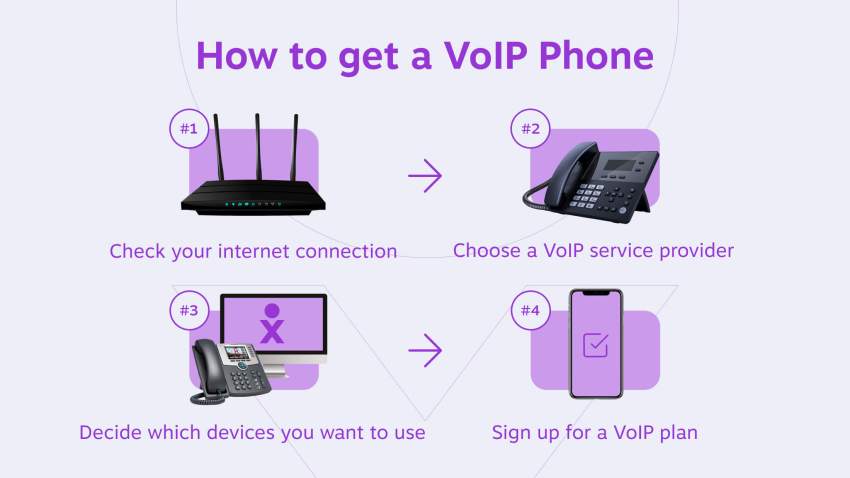
You can get a VoIP phone number from VoIP service providers that offer VoIP service plans. Most plans are less expensive than a cell phone or regular telephone service. As a result, you can lower your costs by up to 60% and access many more features that only VoIP can provide.
If you have existing phone numbers that you’d like to keep, you can port them to your new VoIP service. This process allows you to maintain your current number while enjoying the benefits of VoIP. If you prefer, you can also choose a new local or toll-free VoIP number from your VoIP provider.
Nextiva offers seamless number porting and setup at no extra charge on all its plans. The business phone service plans start at an affordable $15/month, making it a cost-effective option. You can port phone numbers from your cell phone, Google Voice, cable/telephone company, and even a competitive VoIP service provider.
Switch to Nextiva today and save up to 60%
Join now and start calling in less than 10 minutes. Instant set up. Enterprise-grade reliability.
Setting up a VoIP phone number
Once you’ve chosen your VoIP provider and plan, you can typically start using your VoIP system on your computer or smartphone right away.
The provider’s setup process will guide you through configuring your account, selecting your number(s), and customizing your settings. With VoIP, you can enjoy significant cost savings compared to traditional phone services while accessing a wealth of advanced features that enhance your communication capabilities.
Why Should I Get a VoIP Number?
VoIP phone systems offer numerous advantages over traditional phone services. You’ll enjoy cost savings, enhanced flexibility, improved reliability, crystal-clear call quality, and a host of other benefits.
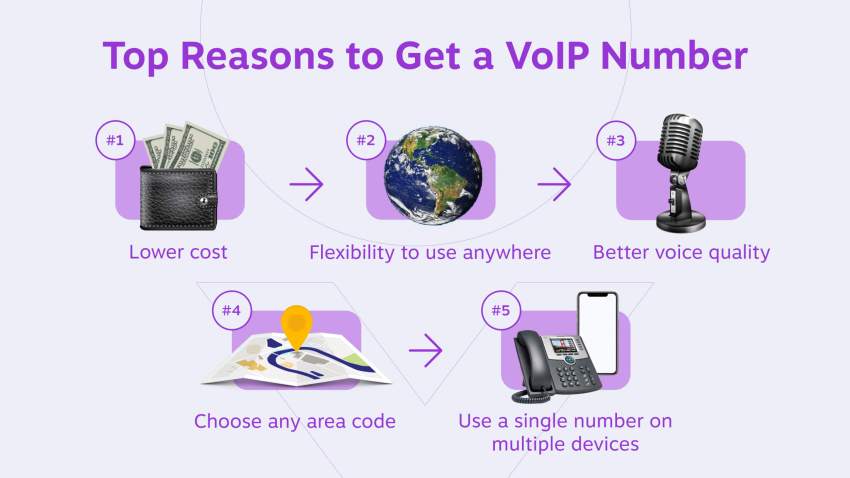
Lower cost
VoIP numbers use your internet connection, eliminating the need for a dedicated phone line. Even with monthly service fees, the overall cost is lower than maintaining a traditional system.
Most VoIP plans include valuable features at no additional charge, such as auto-attendant, call queuing, intelligent call forwarding, and one-click conference calls. You can even get a toll-free number included.
More accessible
A VoIP phone system doesn’t rely on a physical location; all you need is a stable internet connection. This enables communication across the country or even globally. VoIP calls use minimal bandwidth, so even a modest 10MB connection can handle numerous calls simultaneously.
You can reliably use your smartphone and mobile apps to make and receive calls with LTE technology. Wired connections are ideal, but a strong Wi-Fi signal works well too.
More flexible
VoIP networks are highly scalable. Unlike traditional systems, you can easily add multiple phones without limitations, as long as your bandwidth allows.
VoIP numbers work on various devices, including computers, tablets, and dedicated VoIP phones. Many VoIP phones offer accessories like headsets for added convenience. You can even use traditional phones with an Analog Telephone Adapter (ATA).
Better voice quality
VoIP uses advanced sound compression (codecs) to deliver HD call quality, eliminating fuzziness and static. The G.722 codec offers twice the bandwidth of analog calls, ensuring clarity.
In rare cases of limited bandwidth, the call quality gracefully adjusts without any action on your part. Calls to traditional phones still sound great, though they may not be in full HD.
Multiple devices
Use a single virtual number across multiple devices. Log in to your account on any VoIP-compatible device — laptop, computer, or smartphone — to make and receive calls. It’s that simple.
You can also set up call forwarding to other numbers for added flexibility and configure call routing to meet your needs, such as having all or some phones ring simultaneously for a sales team.
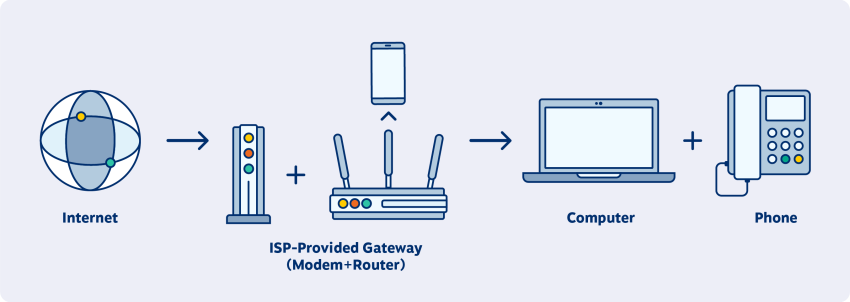
Choice of area codes
Businesses can choose an area code outside their location to establish a local presence in different regions, which builds trust and credibility with customers.
You can also have multiple local numbers route to one location, which is helpful for businesses with multiple branches, making calls from any area code without incurring long-distance charges.
Number portability
There’s no need to change your existing phone number when switching to VoIP. This saves you the hassle of updating your website, business cards, and marketing materials.
Port your old number and continue business as usual, regardless of your location, as long as you have a reliable internet connection.
Toll-free numbers
Toll-free numbers are no longer exclusive to large enterprises. Small and medium-sized businesses can now use them affordably through VoIP, often at no extra charge or a minimal fee.
Toll-free numbers eliminate the perception of being limited to a single geographic area, making your business appear more accessible and national. You can easily receive toll-free calls on your phone or computer, thanks to the flexibility of VoIP and its ability to ring multiple devices simultaneously.
How To Protect Against VoIP Threats
Even though VoIP technology is easy to use and inexpensive to maintain, this modern-day business phone solution is not immune to fraud.
The problem with these kinds of VoIP number tricks is the difficulty in tracing the call. If you do not know what to look for or expect from a VoIP scammer, you too may become a victim of VoIP fraud.
Look for a VoIP provider that provides network-level security through TLS and SRTP. This provides you with the maximum privacy and performance in every VoIP call. Nextiva offers this built-in call encryption, so be sure to ask about it.
What is vishing (VoIP phishing)?
Known as “voice phishing” or “VoIP phishing,” it’s a type of phone scam. The fraud begins with the appearance of a real caller ID displayed with a valid telephone number from a recognized and trusted source.
Then the scammer attempts to convince the unsuspecting individual to disclose critical personal data and financial information.
Often, the callers will prey on two key factors to gain the information they need: a person’s fear and financial stability. This scam is more successful because people generally trust caller ID without knowing it can be faked.
Protecting against VoIP attacks
VoIP phone fraud attacks are sophisticated, which makes it challenging to recognize legitimate calls and attempts at identity theft. Below are a few tips you can develop to protect yourself from these intrusions:
- Never assume every call comes with good intentions, and stay up to date on the latest scams
- Don’t give your confidential information over the phone unless you initiate the call
- Cybersecurity experts suggest changing your login details for all devices once a month
- Never call phone numbers from unsolicited emails sent to you
- If there is any doubt about who is calling, let the caller leave a message on your voicemail
- Regularly review your call logs for questionable outbound call trends
The good news is that successful VoIP fraud attacks are rare. You must be vigilant against the threat; otherwise, you could inadvertently leak your customer list.
Want to dig deeper? We’ve authored the complete guide to VoIP security and call encryption. It’s well worth a read — share it with your team.
Get More Value From Your VoIP Phone System
No matter what numbers you choose, you’re getting incredible value with business VoIP. Telephone and cable companies can’t beat all the features and capabilities that VoIP provides for business owners.
And it’s more than the price that matters. Pick up the phone and call the support line. How long do you wait on hold? How knowledgeable and friendly is the staff? Those factors are important because you don’t have all day to worry about your business phone system.
Switch to Nextiva today and save up to 60%
Join now and start calling in less than 10 minutes. Instant set up. Enterprise-grade reliability.
Nextiva goes further. We crafted our business phone service around giving you the best value and the best service. We invested millions into building the nation’s most reliable business voice network, and our support team members are all in-house. That’s why we were named the best business phone service in 2022.
But don’t just take our word for it, read some of our real customer reviews to see what they think of our service, or talk to a Nextiva expert today to see how we can help.
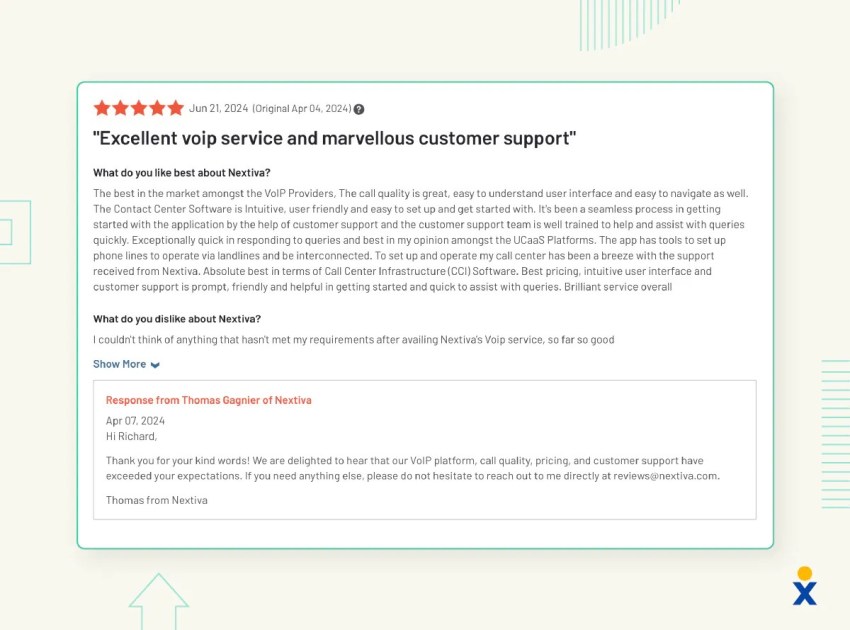


















 VoIP
VoIP 
